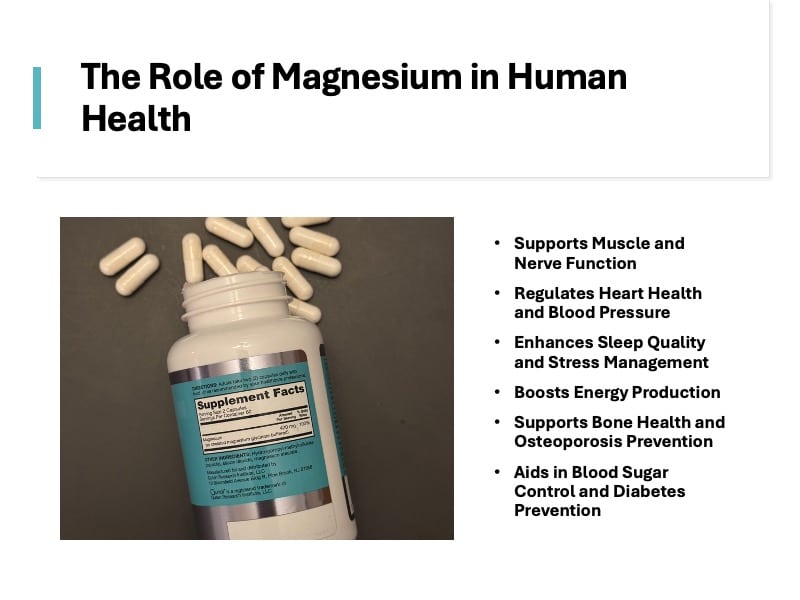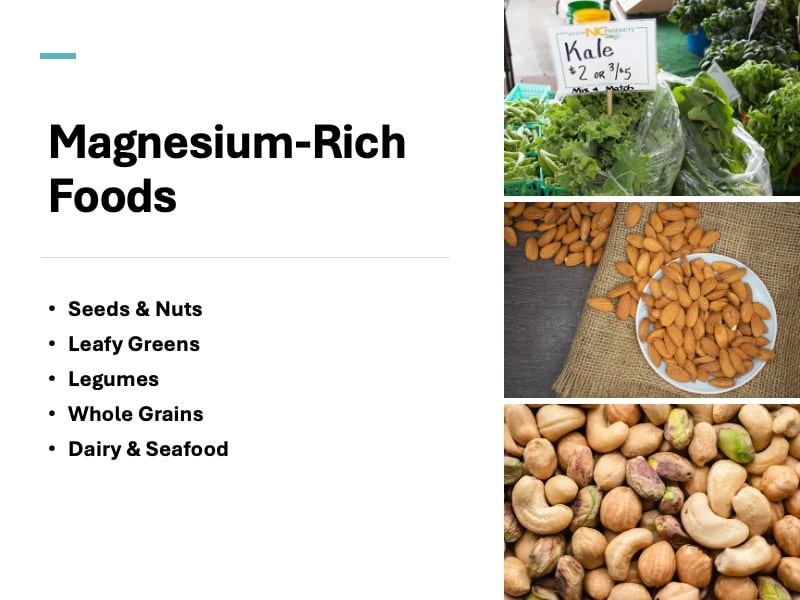Magnesium: Analyzing Effects of Magnesium on Human Health
Magnesium is a critical mineral involved in over 300 enzymatic reactions, influencing muscle function, nerve signaling, heart health, and energy production.
Despite its essential role in the body, nearly two-thirds of people in Western countries fail to meet the recommended daily intake, leading to widespread deficiency-related health issues (Schwalfenberg & Genuis, 2017).
Along with regularly consuming magnesium-rich foods and a diet high in magnesium, I’ve personally used magnesium supplements for years, and they have helped me sleep better, reduce muscle cramping, and manage motor tics associated with Tourette syndrome.
With research continually highlighting the importance of magnesium, understanding its benefits, deficiency symptoms, and supplementation options is crucial for maintaining optimal health and performance.
The Role of Magnesium in Human Health

Magnesium is required for hundreds of biochemical reactions that keep the body functioning efficiently. Some of its most important roles include:
Supports Muscle and Nerve Function
Magnesium is essential for muscle contraction and relaxation, as it regulates calcium and potassium transport in cells.
Low levels can lead to muscle cramps, spasms, and weakness.
It also supports nerve function, ensuring efficient nerve impulse transmission and neuromuscular coordination.
Regulates Heart Health and Blood Pressure
Magnesium helps maintain a steady heartbeat by balancing calcium levels in heart muscle cells.
Research suggests adequate magnesium intake is linked to a lower risk of hypertension and cardiovascular disease (Schwalfenberg & Genuis, 2017).
Enhances Sleep Quality and Stress Management
Magnesium plays a vital role in the production of melatonin and GABA, neurotransmitters that promote relaxation and better sleep.
Studies show magnesium supplementation helps reduce insomnia, anxiety, and stress-related disorders (Rawji et al., 2024).
Magnesium glycinate supplements are the best magnesium for sleep.
Boosts Energy Production
Magnesium is necessary for ATP synthesis, the body’s primary energy source. A magnesium deficiency can lead to fatigue, sluggishness, and reduced exercise performance.
Supports Bone Health and Osteoporosis Prevention
Magnesium helps regulate calcium absorption and bone mineral density, reducing the risk of osteoporosis and fractures (Al Alawi et al., 2018).
Aids in Blood Sugar Control and Diabetes Prevention
Magnesium plays a critical role in insulin function and glucose metabolism, with studies showing higher magnesium intake reduces the risk of type 2 diabetes (Costello et al., 2023).
Symptoms of Low Magnesium
Since magnesium is involved in so many bodily processes, deficiency can cause a wide range of symptoms, including:
- Muscle cramps, twitches, and weakness
- Poor sleep and insomnia
- Increased stress, anxiety, and irritability
- Fatigue and low energy levels
- High blood pressure and irregular heartbeat
- Frequent headaches or migraines
- Tingling or numbness in the limbs
Chronic magnesium deficiency has also been linked to osteoporosis, insulin resistance, and increased inflammation.
Causes of Magnesium Deficiency
Despite the variety of magnesium-rich foods available, many people fail to meet their daily needs.
Several factors contribute to low magnesium levels, including:
- Poor Diet – Refined grains and processed foods remove the magnesium-rich germ and bran, lowering the overall nutrient content.
- High-Stress Lifestyles – Chronic stress increases magnesium excretion, leading to deficiency.
- Excessive Caffeine and Alcohol Consumption – Both act as diuretics, flushing magnesium from the body.
- Certain Medications – Diuretics, antibiotics, and proton pump inhibitors (PPIs) reduce magnesium absorption.
- Intense Exercise – Athletes lose more magnesium through sweat and increased metabolic demands.
- Soil Depletion – Modern farming techniques have stripped the soil of magnesium and other essential minerals, reducing the natural content in crops.
Magnesium-Rich Foods

While magnesium supplements are beneficial, the best way to maintain optimal levels is through magnesium-rich foods.
Whole, unprocessed foods provide not only magnesium but also complementary nutrients like fiber, antioxidants, and essential vitamins that enhance absorption and overall health.
Adding these magnesium-packed foods to your daily diet can help reduce stress, improve muscle function, support heart health, and enhance energy levels—all without the need for extra supplements.
Seeds & Nuts
Seeds and nuts are some of the most concentrated sources of magnesium, making them an easy and delicious way to boost your intake.
- Pumpkin Seeds – One of the highest sources of magnesium, providing about 156 mg per ounce—over 35% of the daily value (DV)!
- Chia Seeds – Not only rich in magnesium (111 mg per ounce) but also loaded with omega-3s and fiber for digestive and heart health.
- Almonds & Cashews – Perfect for a quick snack, these nuts provide 75-80 mg of magnesium per ounce, along with healthy fats and protein.
Tip: Sprinkle pumpkin or chia seeds over yogurt, oatmeal, or smoothies to effortlessly increase your daily magnesium intake.
Leafy Greens
Dark leafy greens are loaded with magnesium, iron, and vitamin K, supporting bone health, oxygen circulation, and muscle function.
- Spinach – One of the top plant-based sources, with 78 mg per half-cup of cooked spinach.
- Kale & Swiss Chard – Excellent choices for magnesium, fiber, and antioxidants, promoting overall wellness.
Tip: Sauté spinach or kale with olive oil and garlic for a flavorful, magnesium-rich side dish.
Legumes
Legumes—such as beans, lentils, and edamame—are magnesium-rich, fiber-dense, and excellent sources of plant protein.
- Black Beans – Provide 60 mg per half-cup, along with fiber to support gut health.
- Lentils – A great plant-based protein source, delivering 35 mg of magnesium per half-cup.
- Edamame – Offers 50 mg per half-cup, plus a solid dose of protein and fiber.
Tip: Add black beans to salads, blend lentils into soups, or snack on steamed edamame for a magnesium boost.
Whole Grains
Whole grains contain more magnesium than refined grains, making them an important part of a balanced diet.
- Brown Rice – Provides 42 mg per half-cup, making it a better choice than white rice.
- Quinoa – One of the best plant-based protein sources, delivering 118 mg of magnesium per cup.
- Whole Wheat Bread & Oats – Fortified whole grains contain around 20-40 mg per serving, supporting sustained energy and digestion.
Tip: Swap out white rice for quinoa or brown rice in your meals to get more magnesium naturally.
Dairy & Seafood
Magnesium is often overlooked in dairy and seafood, but these foods offer an excellent balance of magnesium, calcium, and healthy fats.
- Yogurt – Provides 42 mg per cup, supporting gut health and bone strength.
- Salmon & Mackerel – Not only rich in omega-3 fatty acids but also a great source of magnesium to support cardiovascular and brain health.
Tip: Add Greek yogurt with seeds and nuts for a magnesium-packed breakfast, or include grilled salmon in your dinner for a boost in essential minerals.
Magnesium Supplements
While a magnesium-rich diet is the best way to meet daily requirements, many people still fall short due to poor soil quality, food processing, high stress levels, and lifestyle factors.
Since magnesium plays a role in muscle recovery, sleep, energy production, and overall health, low levels can lead to fatigue, cramps, anxiety, and poor sleep quality.
For those who struggle to get enough magnesium through food alone, supplementation can be an effective way to maintain optimal levels.
However, not all magnesium supplements are created equal—different forms offer varying levels of bioavailability and benefits.
Understanding the best types of magnesium and how to use them properly can help you choose the most effective supplement for your needs.
Optimal Dosage for Magnesium Supplementation
The Recommended Daily Allowance (RDA) for magnesium is:
- Men (31+ years): 420 mg/day
- Women (31+ years): 320 mg/day
- Pregnant Women: 350–400 mg/day
For supplementation, a dose of 200–400 mg/day is safe and effective for most adults.
Upper Tolerable Intake Level (UL) and Safety Considerations
The IOM originally set the UL for supplemental magnesium at 350 mg/day due to concerns about digestive issues like diarrhea (Costello et al., 2023).
However, newer research suggests that doses up to 500-600 mg/day are well toleratedin most individuals.
To minimize side effects, start with 200–300 mg/day and adjust as needed.
Best Magnesium Supplements
With so many magnesium supplements available, choosing the right one can be overwhelming.
The effectiveness of a supplement depends on the form of magnesium, its bioavailability, and your specific health goals.
Some types, like magnesium glycinate, are great for relaxation and sleep, while others, such as magnesium malate, boost energy and muscle recovery.
Whether you need better sleep, muscle recovery, stress relief, or overall health support, finding the right magnesium supplement can make a noticeable difference in your daily well-being.
Magnesium Glycinate – Best for Sleep, Stress, and Relaxation
Highly bioavailable and gentle on digestion, magnesium glycinate is excellent for reducing anxiety, improving sleep, and relaxing muscles.
My Favorite: Qunol Magnesium Glycinate (420mg) – High absorption and affordable.
Last update on 2025-07-11 / This article includes affiliate links/Images via Amazon Product Advertising API. I may earn commissions on purchases made through these links.
Magnesium Threonate – Best for Brain Health & Cognitive Function
Magnesium threonate is one of the only forms that crosses the blood-brain barrier, improving memory, learning, and mental clarity.
Magnesium Malate – Best for Energy & Muscle Recovery
Ideal for those with chronic fatigue, muscle soreness, or fibromyalgia, as it enhances ATP production.
Magnesium Citrate – Best for Digestion & Constipation Relief
This form has high bioavailability but can cause a laxative effect, making it useful for those with occasional constipation.
Magnesium Chloride – Best for Topical Absorption & Muscle Relaxation
Often found in magnesium sprays and baths, this form absorbs through the skin to relieve muscle tension.
Final Thoughts: The Importance of Magnesium
Magnesium is one of the most essential yet overlooked minerals for overall health.
It plays a vital role in muscle function, nerve signaling, heart health, energy production, and stress management, making it indispensable for athletes, active individuals, and anyone looking to optimize their well-being.
Despite its importance, many people fail to get enough magnesium, often due to poor diet, soil depletion, stress, and lifestyle factors.
Prioritizing magnesium-rich foods—such as leafy greens, nuts, seeds, whole grains, and fish—is the best way to ensure optimal intake.
However, for those who struggle to meet daily needs, magnesium supplements offer an effective and convenient solution.
Choosing the right type of magnesium—such as magnesium glycinate for sleep and stress, magnesium citrate for digestion, or magnesium malate for energy—can help address specific health concerns and enhance daily performance and recovery.
From my own experience, supplementing with magnesium has been invaluable for improving sleep, muscle recovery, and managing my Tourette syndrome symptoms.
Whether through diet or supplementation, ensuring adequate magnesium intake is one of the simplest and most impactful ways to support long-term health, energy levels, and overall well-being.
This website does not provide medical advice. This website site does contain affiliate links, and purchases may earn a commission.
Read my Medical Disclaimer, Review Disclaimer, and Publishing Policies for more details. Use of this site indicates acceptance of these terms.




